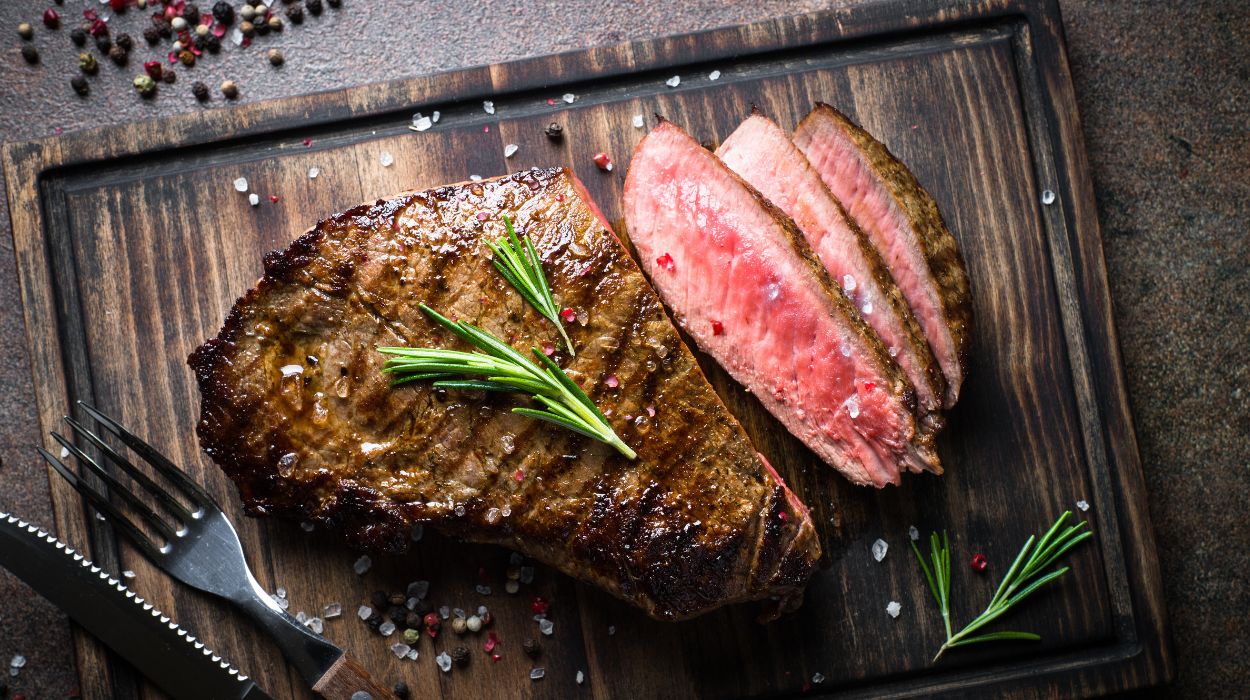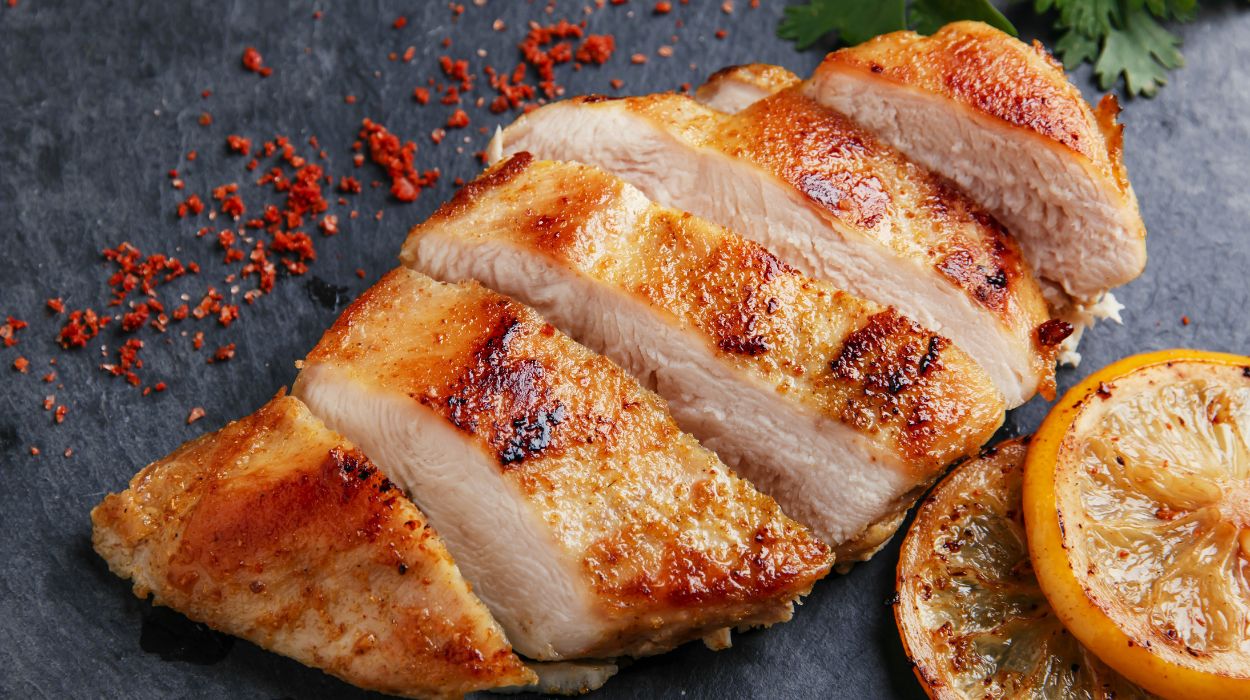When you decide to lose weight, there are specific lifestyle changes that you want to adopt. One major lifestyle change is a new diet targeted toward weight loss. Meat is usually a priority of many regular meals — your healthy breakfast might include bacon, eggs, or fish.
However, since they are high-calorie foods, you should tailor your options with the best meats for weight loss. In this article, we will explore what meats are good for weight loss and the importance of choosing the best meats to lose weight. We will see the best meats for weight loss and how they work. We will also see some meat that should be avoided when you want to lose weight.
What Meats Are Good For Weight Loss
When it comes to weight loss, the right meal plan is important. Some meats are higher in calories and unhealthy fats, while others are leaner and can benefit weight loss. Here are six types of meat that are generally good options for weight loss:
- Grass-fed beef.
- The skinless white meat of chicken.
- Lean pork.
- The skinless white meat of the turkey.
- Fish.
- Buffalo.
Best Meats For Weight Loss
Weight loss is a multi-faceted journey that involves several key steps. With how often people search for how many carbs a day to lose weight, it is clear that diet is one of the key factors in weight loss.[1] Losing weight requires reducing calorie intake.
Calorie intake is important because a calorie deficit prompts your body to burn stored fat for energy. Calorie deficits can be accomplished by choosing nutrient-dense foods and controlling portion sizes.
However, choosing the right foods should also be a priority. A weight-loss diet includes healthy carbohydrates, lean proteins, and healthy fats that are low in calories and high in healthy nutrients. In this context, how does meat tie into weight loss?
Meat is animal flesh that is typically used as food. It can be obtained from various animals, including mammals, birds, and sometimes fish. It is a rich source of essential nutrients, including high-quality vitamins and minerals. It provides a significant portion of the dietary protein consumed worldwide and is a staple in many diets. Meat is also an excellent food for losing weight due to its protein content.
Without further ado, here are the six best types of meat for weight loss:
Grass-Fed Beef

The first meat on our list is grass-fed beef. This is meat that comes from cattle primarily raised on a diet of grass and other forage, as opposed to conventionally grown cattle that are often fed grains. Grass-fed beef is considered a healthier[2] and more environmentally sustainable choice.[3]
It also applies to weight loss as grass-fed beef is leaner and contains fewer calories. It is higher in nutrients,[2] such as omega-3 fatty acids and antioxidants. This healthier fat profile can be beneficial for weight loss.
Beef is also a high-quality source of protein. Protein helps with satiety and muscle preservation,[4] ultimately promoting weight loss.
Also, a study[5] showed that grass-fed beef could exert protective effects against several diseases ranging from cancer to cardiovascular disease. This is due to higher amounts of heart-healthy omega-3 fatty acids and lower levels of omega-6 fatty acids, which are associated with inflammation.
Skinless Chicken
Skinless chicken, specifically skinless chicken breast, is a popular and healthy choice for weight loss. Skinless chicken is naturally low in calories. Its nutritional profile[6] also contains protein, vitamins B6 and B3, selenium, and phosphorus. These nutrients support our health and can be part of a healthy diet for weight management.
Furthermore, skinless chicken is lean and contains minimal fat, making it helpful for weight loss. A lower fat content[7] is synonymous with weight loss. It also has very little saturated fat, which is the type of fat associated with heart disease and weight gain.
Lean Pork
Lean pork or pork tenderloin has emerged as a new and healthier alternative for many types of meat. It is also known as the other white meat because it is a good source of lean protein, like chicken and turkey. It also has a robust nutritional profile[8] with lower calories and fat than other meats.
Lean pork helps with weight loss because research[9] shows that it has a significant impact on cardiometabolic health. It can help prevent diabetes, high cholesterol, and obesity. It is also associated with better physical activity and energy levels.
White Turkey Meat

White turkey meat has a suitability for weight management that is attributed to several key attributes. First, it is remarkably low in calories,[10] making it a no-brainer choice for weight loss. Skinless, boneless turkey, in particular, is exceptionally lean, ensuring that calorie intake is controlled while offering high-quality protein.
The protein content helps reduce calorie consumption by promoting feelings of fullness. Despite its leanness, turkey offers essential nutrients, including phosphorus and zinc. One notable benefit of turkey is its DHA omega-3 content.[11]
DHA omega-3 fatty acids improve brain function and body fat management. Furthermore, turkey is naturally low in saturated fats, which is associated with weight gain and heart disease. This makes it a heart-healthy option that aligns well with weight management goals. So, if you are making a list of the best breakfast meats for weight loss, add turkey.
Fish
While asking what meat is good for weight loss, does fish often come to mind? Fish is an underrated but highly beneficial choice if you want to lose weight and stay healthy. Like others on this list, fish is loaded with protein. Protein helps preserve your muscles and keep you feeling full, which means you’re less likely to overeat.
Most fish are low in saturated fat as well, which makes them a smart choice for watching your weight. But some fish, like salmon[12] and mackerel, go above and beyond due to omega-3 fatty acids. This helps your heart and makes it harder for fat cells to grow.[13]
Additionally, fish is packed with vitamins and minerals that are good for your health. Whether you’re picking salmon, trout, or cod, fish can be a fantastic part of your diet as you work on managing your weight. It’s not just tasty but also great for your health.
Buffalo
Buffalo meat has been steadily gaining recognition, and it’s not without good reason. It’s become a standout choice due to its nutritional profile, offering a lean alternative to traditional beef.[14] In fact, bison meat stands out with half the fat content[15] and fewer calories compared to beef.
But that’s not all; choosing bison comes with extra health benefits.[16] In a single serving, you’ll get vitamins such as vitamin B12, a nutrient known for its energy-boosting properties and role in weight management.
Another reason to consider bison meat is that it also falls under the natural grass-fed status. Since bison graze on grass, you can enjoy your bison burger with confidence, knowing it’s free from hormones and pollutants that can potentially accumulate in your body.
Is Meat Good For Weight Loss?
There are various approaches to weight loss, but the foods we choose to fuel our bodies can make a big difference. Food, supplements, exercise, and more all work together to help with losing weight.
For dieting, many people think that less is better. As such, they believe that meat should be avoided when trying to lose weight. So, is meat good for weight loss? Yes, it is. Meat is a rich source of a muscle-building nutrient called protein, with different types of meat varying in their protein content.
If you are sedentary, try to get 1.2 to 1.8 grams of protein per kg of body weight daily, as current studies deem the recommended daily intake of .8 grams/kg inadequate. Overweight people should strive for 1.2-1.5 grams per kg of body weight, and active people should get up to 2 grams/kg.[17] A high protein diet[18] of 2.4 grams/kg has been associated with reduced fat mass, and consuming less than 1.2 grams/kg is deemed insufficient.
The protein present in the best lean meats is a bedrock of building muscle mass. It also makes meat one of the best appetite suppressant foods, helpful in losing weight. You might wonder, “How much protein should I eat?”
Lastly, a successful weight loss plan involves more than just healthy meats. If you want to learn how to eat to lose belly fat, for example, try a balanced diet that includes various foods, including fruits, vegetables, whole grains, and healthy fats. Meat is one part of this balanced approach.
Meats To Avoid When You’re Losing Weight
When you’re trying to lose weight, there are certain meats that you may want to consume in moderation or avoid altogether due to their higher calorie and fat content. Here are some meats to be cautious of or limit in your weight loss diet:
Processed Meats
The first type of meat you should avoid is processed meat. These include meats like sausages, hot dogs, bacon, and deli meats. Why? Because they are often high in saturated fats, sodium, and preservatives.
Aside from their high-fat content, they are also linked to an increased risk of health issues[19] like heart disease and certain cancers. It’s best to eliminate processed foods from your diet as soon as feasible.
Fatty Cuts Of Red Meat
Cuts of red meat with higher fat content, such as ribeye steak, T-bone steak, and prime rib, are calorie-dense. Fatty meats can be counterproductive when you are trying to lose body weight. The extra calories can harm your weight loss efforts. Instead, choose lean cuts like tenderloin, flank, or sirloin steak.
Organ Meats
Another meat to avoid is internal organ meats. Organ meats[20] like liver and kidney are often higher in calories and cholesterol when compared to muscle meats. Higher calorie and cholesterol content may translate to weight gain, which is not the goal in this case. So, organ meat should be avoided or consumed in moderation, if at all, especially if you are trying to lose weight, avoid high cholesterol, or other health concerns.
Fried Meats
Fried foods that are deep-fried or pan-fried in oil absorb a significant amount of additional calories[21] and unhealthy fats. It’s better to choose cooking methods like grilling, baking, broiling, or steaming.
Skin On Poultry
The skin of poultry, like chicken and turkey, is high in fat, especially saturated fat. That is why lean meat is a healthier option because the skin has been stripped to reduce the calorie and fat content significantly.
Conclusion
Selecting the right diet is a key component of a successful weight loss journey, and eating meat can help increase your protein intake to support your goals. Lean and low-fat protein sources, such as skinless chicken breasts and turkey, provide a satisfying and nutritious foundation for your diet. Additionally, fish, with its heart-healthy omega-3 fatty acids, can be another valuable addition. However, not all meat is created equal. Here, we have outlined the best meats for weight loss and how they can be helpful to your healthy weight loss journey.
Frequently Asked Questions
The healthiest meat is typically considered to be lean and white poultry meat. This includes skinless chicken or ground turkey. This is due to its low saturated fat content and high protein.
You can eat leaner meats like chicken or turkey daily as part of a balanced diet. However, it’s essential to vary your protein sources for better overall nutrition. We advise that you consult your healthcare provider first.
Two eggs provide a good source of protein, but whether it’s enough depends on your dietary needs. One egg is generally beneficial for adults. You can include them as part of a balanced diet for protein.
Eating chicken daily can be a part of a balanced diet, as long as you vary your protein sources and ensure a well-rounded nutrient intake.
Eating fish daily can be a healthy choice due to its omega-3 fatty acids and protein. Variety in the type of fish is advisable for a balanced diet.
 Evidence Based
Evidence Based
